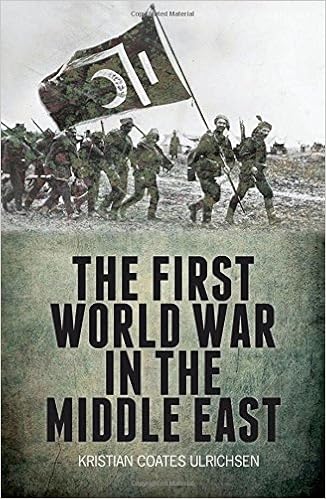
Published on the centenary of the Great War, Kristian Coates Ulrichsen's study, "The First World War in the Middle East" (2014), offers a relatively rare perspective in thinking about WW I and presents important historical background to current events in the Middle East. It is well-researched and thoughtfully written on both counts. Individual events in the WW I Middle East have been studied extensively, but, as Ulrichsen points out, there have been no prior single-volume histories of the Middle Eastern theater in its entirety. Actions in the Middle East may not have impacted the ultimate result of the War, but Ulrichesen shows that they do not deserve to be considered, as is frequently the case, as a sideshow. Ulrichsen, the author of an earlier Middle East study, "Insecure Gulf: The End of Certainty and the Transition to the Post-Oil Era", is a research fellow in Public Policy at Rice University and an associate fellow on the Middle East North Africa Programme at Chatham House, the Royal Institute of International Affairs, in London.
Ulrichsen describes how WW I led at last to the end of the Ottoman Empire, which fought on the side of Germany, and to the creation of independent nation-states in the Middle East. The author writes: "[t]he entire political landscape of the region was reshaped as the legacy of the war sapped the ability of imperial 'outsiders' to dominate and influence events and nationalist groups succeeded in mobilising mass movements around distinctly national identities. Yet, this occurred just as the actual and potential value of Middle Eastern oil became a permanent feature of a new set of Western geostrategic considerations." The book examines critical war events in what became contemporary Iraq, Saudi Arabia, Turkey, Egypt, and Israel; and it shows the continued legacy of military and political actions during the Great War.
The book is in three parts. In the opening part, Ulrich examines the Ottoman Empire, Britain, France, and Germany as they stood prior to the outbreak of the War. He also offers an insightful overview of the fighting in the Middle East which emphasizes the backwardness of the region in terms of economic development and infrastructure and the difficult logistics involved in fighting a large-scale war on treacherous terrain far from a governmental base and from a secure source of supplies. Large-scale famine was an immediate result in many places of the Middle East conflict.
The central part of the book studies the military campaigns. From a military perspective, the most significant were the campaigns involving Russia and the Ottoman Empire early in the war which resulted in the bulk of the Ottoman Empire's casualties and diverted its soldiers and resources away from other theaters. Ulrichsen offers a good discussion of the disputed Armenian Massacre by the Ottoman Empire in the context of this early fighting.
The book describes the long fighting at Gallipoli which is the best-remembered part of the Middle East war and its impact on the growth of national identity in Australia, New Zealand, and Turkey. Further broad sections of the book examine the conflict in Egypt and in Gaza which led ultimately to Great Britain's capture of Jerusalem and to the Balfour Declaration. The book then discusses the war in Mesopotamia which led to its disastrous surrender of a garrison at Kut in 1916 prior to the taking of Baghdad. Ulrichsen's account of the Mesopotanian War shows eerie similarities to the American and British experience in the early 21st Century invasion of Iraq.
The final section of the book shows the complex political situation that resulted from the collapse of the Ottoman Empire. Western imperialism and Arab nationalism formed a volatile mix which set the stage for the continued instability of the Middle East.
The most glaring ommission of the book is the lack of maps which makes the military accounts difficult to follow for readers without an excellent prior knowledge of the region's geography. The two maps on the frontice-piece are crude and inadequate and include the embarassing misspelling of "Ottomon" Empire. The writing style of the book is frequently turgid. Regardless of these flaws, Ulrichsen has written an important and valuable book which explains WW I in the Middle East and its continued importance. I learned a great deal from this study. It will be of value to readers with an interest in the contemporary Middle East or in WW I.
No comments:
Post a Comment